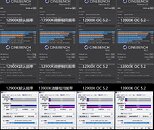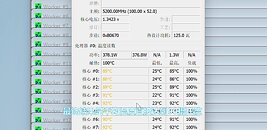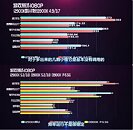- Joined
- Oct 9, 2007
- Messages
- 47,598 (7.45/day)
- Location
- Dublin, Ireland
| System Name | RBMK-1000 |
|---|---|
| Processor | AMD Ryzen 7 5700G |
| Motherboard | Gigabyte B550 AORUS Elite V2 |
| Cooling | DeepCool Gammax L240 V2 |
| Memory | 2x 16GB DDR4-3200 |
| Video Card(s) | Galax RTX 4070 Ti EX |
| Storage | Samsung 990 1TB |
| Display(s) | BenQ 1440p 60 Hz 27-inch |
| Case | Corsair Carbide 100R |
| Audio Device(s) | ASUS SupremeFX S1220A |
| Power Supply | Cooler Master MWE Gold 650W |
| Mouse | ASUS ROG Strix Impact |
| Keyboard | Gamdias Hermes E2 |
| Software | Windows 11 Pro |
Intel's upcoming Core i9-13900K "Raptor Lake" flagship desktop processor continues to amaze with its performance lead over the current i9-12900K "Alder Lake," in leaked benchmarks of the processor tested in a number of synthetic benchmarks. The 8P+16E hybrid processor posts a massive 30% lead in multi-threaded performance with Cinebench R23, thanks to higher IPC on the P-cores, the addition of 8 more E-cores, higher clock speeds, and larger caches all around. These gains are also noted with CPU-Z Bench, where the i9-13900K is shown posting a similar 30% lead over the i9-12900K.
In gaming benchmarks, these leads translate into a roughly-10-15 percent gain in frame-rates. Games still aren't too parallelized, Intel Thread Director localizes gaming workloads to the P-cores, which remain 8 in number. And so, the gaming performance gains boil down mainly to the IPC increase of the "Raptor Cove" P-cores, and their higher clock-speeds, compared to the 8 "Golden Cove" P-cores of the i9-12900K. From the looks of it, the i9-13900K will maintain a competitive edge over the upcoming AMD Ryzen 9 7950X mainly because the high IPC of 8 (sufficient) P-cores sees it through in gaming benchmarks, while the zerg-rush of 24 cores clinches the deal in multi-threaded benchmarks that scale across all cores.



View at TechPowerUp Main Site | Source
In gaming benchmarks, these leads translate into a roughly-10-15 percent gain in frame-rates. Games still aren't too parallelized, Intel Thread Director localizes gaming workloads to the P-cores, which remain 8 in number. And so, the gaming performance gains boil down mainly to the IPC increase of the "Raptor Cove" P-cores, and their higher clock-speeds, compared to the 8 "Golden Cove" P-cores of the i9-12900K. From the looks of it, the i9-13900K will maintain a competitive edge over the upcoming AMD Ryzen 9 7950X mainly because the high IPC of 8 (sufficient) P-cores sees it through in gaming benchmarks, while the zerg-rush of 24 cores clinches the deal in multi-threaded benchmarks that scale across all cores.



View at TechPowerUp Main Site | Source








